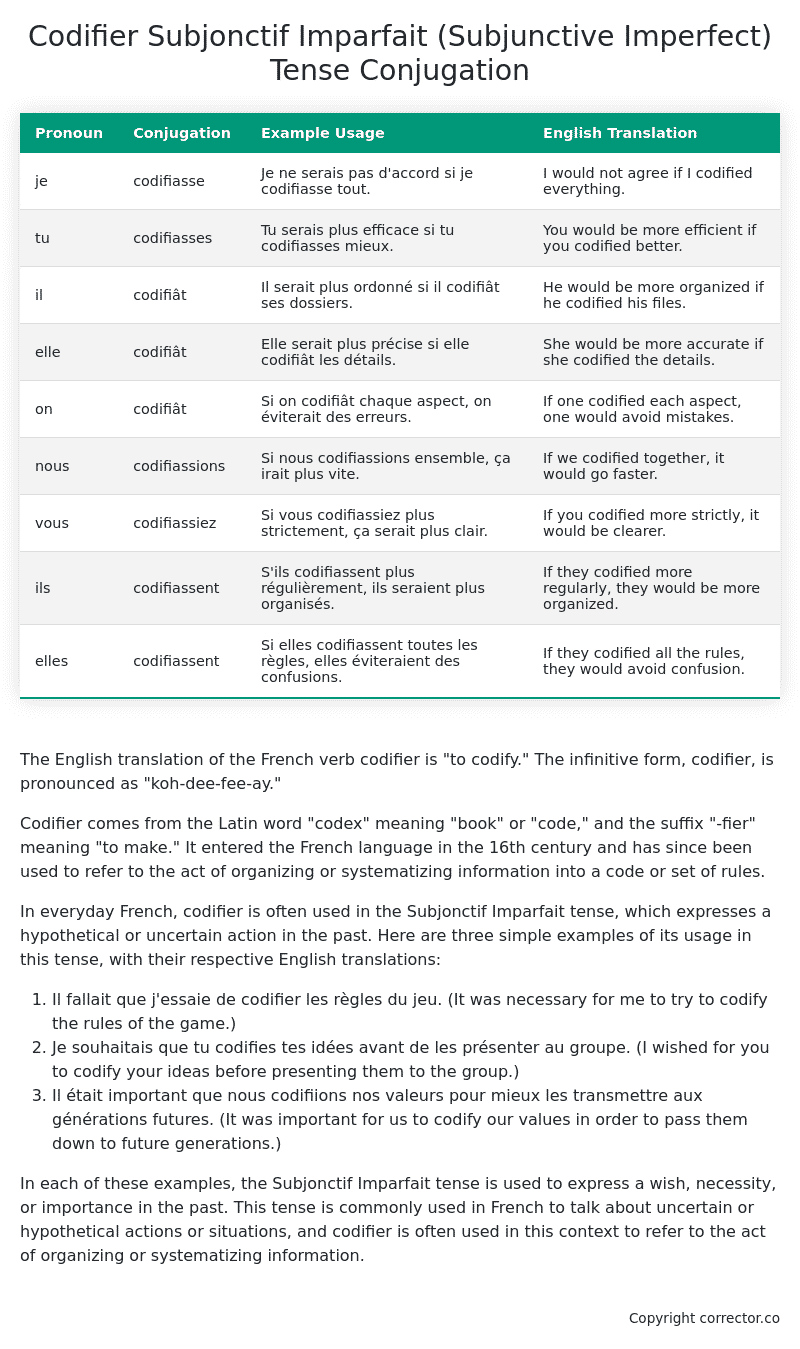Subjonctif Imparfait (Subjunctive Imperfect) Tense Conjugation of the French Verb codifier
Introduction to the verb codifier
The English translation of the French verb codifier is “to codify.” The infinitive form, codifier, is pronounced as “koh-dee-fee-ay.”
Codifier comes from the Latin word “codex” meaning “book” or “code,” and the suffix “-fier” meaning “to make.” It entered the French language in the 16th century and has since been used to refer to the act of organizing or systematizing information into a code or set of rules.
In everyday French, codifier is often used in the Subjonctif Imparfait tense, which expresses a hypothetical or uncertain action in the past. Here are three simple examples of its usage in this tense, with their respective English translations:
- Il fallait que j’essaie de codifier les règles du jeu. (It was necessary for me to try to codify the rules of the game.)
- Je souhaitais que tu codifies tes idées avant de les présenter au groupe. (I wished for you to codify your ideas before presenting them to the group.)
- Il était important que nous codifiions nos valeurs pour mieux les transmettre aux générations futures. (It was important for us to codify our values in order to pass them down to future generations.)
In each of these examples, the Subjonctif Imparfait tense is used to express a wish, necessity, or importance in the past. This tense is commonly used in French to talk about uncertain or hypothetical actions or situations, and codifier is often used in this context to refer to the act of organizing or systematizing information.
Table of the Subjonctif Imparfait (Subjunctive Imperfect) Tense Conjugation of codifier
| Pronoun | Conjugation | Example Usage | English Translation |
|---|---|---|---|
| je | codifiasse | Je ne serais pas d’accord si je codifiasse tout. | I would not agree if I codified everything. |
| tu | codifiasses | Tu serais plus efficace si tu codifiasses mieux. | You would be more efficient if you codified better. |
| il | codifiât | Il serait plus ordonné si il codifiât ses dossiers. | He would be more organized if he codified his files. |
| elle | codifiât | Elle serait plus précise si elle codifiât les détails. | She would be more accurate if she codified the details. |
| on | codifiât | Si on codifiât chaque aspect, on éviterait des erreurs. | If one codified each aspect, one would avoid mistakes. |
| nous | codifiassions | Si nous codifiassions ensemble, ça irait plus vite. | If we codified together, it would go faster. |
| vous | codifiassiez | Si vous codifiassiez plus strictement, ça serait plus clair. | If you codified more strictly, it would be clearer. |
| ils | codifiassent | S’ils codifiassent plus régulièrement, ils seraient plus organisés. | If they codified more regularly, they would be more organized. |
| elles | codifiassent | Si elles codifiassent toutes les règles, elles éviteraient des confusions. | If they codified all the rules, they would avoid confusion. |
Other Conjugations for Codifier.
Le Present (Present Tense) Conjugation of the French Verb codifier
Imparfait (Imperfect) Tense Conjugation of the French Verb codifier
Passé Simple (Simple Past) Tense Conjugation of the French Verb codifier
Passé Composé (Present Perfect) Tense Conjugation of the French Verb codifier
Futur Simple (Simple Future) Tense Conjugation of the French Verb codifier
Futur Proche (Near Future) Tense Conjugation of the French Verb codifier
Plus-que-parfait (Pluperfect) Tense Conjugation of the French Verb codifier
Passé Antérieur (Past Anterior) Tense Conjugation of the French Verb codifier
Futur Antérieur (Future Anterior) Tense Conjugation of the French Verb codifier
Subjonctif Présent (Subjunctive Present) Tense Conjugation of the French Verb codifier
Subjonctif Passé (Subjunctive Past) Tense Conjugation of the French Verb codifier
Subjonctif Imparfait (Subjunctive Imperfect) Tense Conjugation of the French Verb codifier (this article)
Subjonctif Plus-que-parfait (Subjunctive Pluperfect) Tense Conjugation of the French Verb codifier
Conditionnel Présent (Conditional Present) Tense Conjugation of the French Verb codifier
Conditionnel Passé (Conditional Past) Tense Conjugation of the French Verb codifier
L’impératif Présent (Imperative Present) Tense Conjugation of the French Verb codifier
L’infinitif Présent (Infinitive Present) Tense Conjugation of the French Verb codifier
Struggling with French verbs or the language in general? Why not use our free French Grammar Checker – no registration required!
Get a FREE Download Study Sheet of this Conjugation 🔥
Simply right click the image below, click “save image” and get your free reference for the codifier Subjonctif Imparfait tense conjugation!

Codifier – About the French Subjonctif Imparfait (Subjunctive Imperfect) Tense
Formation
Common Everyday Usage Patterns
Interactions with Other Tenses
Subjonctif Présent
Indicatif Passé Composé
Conditional
Conditional Perfect
Summary
I hope you enjoyed this article on the verb codifier. Still in a learning mood? Check out another TOTALLY random French verb conjugation!


